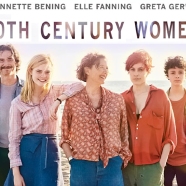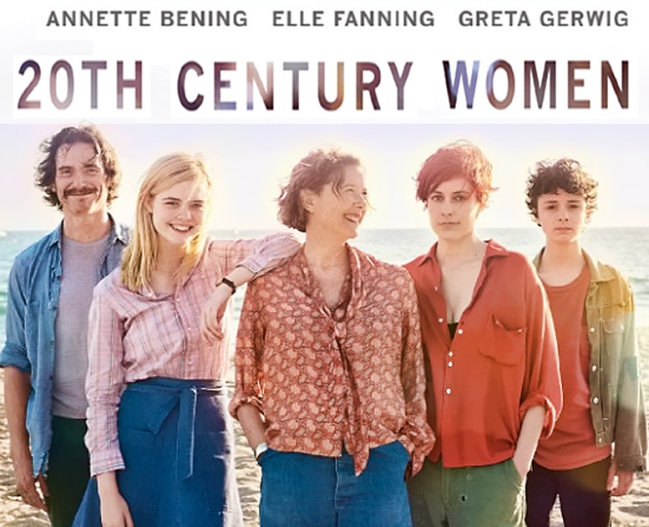 March
02
March
02
Tags
20th Century Women (2016)

The coming-of-age genre looks at turning points like sexual awakening, maturing identity, and rites of adulthood. Often gender stereotyped, the genre tends to use a retro-nostalgic lens because we feel safer looking back. The film 20th Century Women (2016) follows these conventions but in its own way breaks out of the usual gender boxes with a narrative that pivots on a few words delivered innocently: “Don’t you need a man to raise a man?”.
It is 1979 in free-spirited California where 55 year-old divorcee Dorothea (Annette Bening) feels inadequate in raising her loner 15 year-old son Jamie (Lucas Zumann). She enlists the support of boarder Abbie (Greta Gerwig) and Jamie’s best friend Julie (Elle Fanning) by asking them to talk to him about the kind of things a teenage boy cannot talk about with a mother. The three women are intelligent, open communicators and Jamie is immersed in a feminised world-view, with a post-hippy handyman friend providing a token male presence.
What follows is more like a rich montage of charming moments than significant narrative developments. Jamie is taken to cool music places, has long private chats with Abbie and Julie, is given feminist literature to soften his emerging masculinity, and is sensitised to the sexual ethics that will shape his future relationships. Among other things, he learns about loving the whole woman not just her sexual parts; the physiology of female orgasm; and the value of platonic friendship. As a period piece, it richly evokes the fashion, music, and customs of a time that many audiences will view through rose-coloured glass: a simpler, safer, and more truthful time.
Greta Gerwig and Elle Fanning are cast perfectly as embodiments of the growing girl-power of the era. But the acting dynamics are driven entirely by Annette Bening and Lucas Zumann. While the story may be about Jamie’s entry to manhood, it is told through Dorothea’s eyes. Benning convincingly portrays the full emotional gamut of the single mother of a teenage boy: overwhelming love; confusion; anxiety; and struggling for, while steadily losing, parental authority. Zumann is wonderful in his role, balancing premature worldly wisdom, innocence and youthful passion for life. The film’s plot is as laidback as the era it depicts, but the characterisation and performances have depth and sincerity.
This film challenges the popular wisdom that a boy needs a father to make him a man. Jamie’s emerging masculinity is femo-centric, emotionally sensitive, open and responsive. In one sense, this coming-of-age story is as stereotyped as any other because of the way it portrays tension between gender differences. But it inverts the usual ‘boys are active agents/girls are passive victims’ binary. In a world where traditional definitions of family are under constant debate and renewal, this film adds another viewpoint on how to teach young males to respect females. While it is an entertaining and engaging comedy-drama, it also asks serious questions about how is it that in the 21st century we still raise men who commit violence against women.

Director: Mike Mills
Stars: Annette Bening, Elle Fanning, Greta Gerwig, Lucas Zumann

This is a great review, it has made me like the film even more than when I first saw it. Thank you.
LikeLiked by 1 person
Its funny how that happens; I often read someone’s review of a film I might have seen a long time ago and it amplifies the memories. Thanks for commenting Nick.
LikeLiked by 2 people
I loved this film’s feminist perspective. I found that really subversive and refreshing about it. As you said, it doesn’t always take a father to make a boy into a man. This has got to be one of last year’s most underrated films.
LikeLiked by 2 people
I agree; it is subversive, particularly in the context of today’s debate about gay marriage where some argue that a child needs to be raised by both a mother and a father. Thanks for commenting.
LikeLiked by 1 person
Nice review ! I totally loved this movie, its story is so realistic and threats themes in such an authentic way. Very surprising film.
LikeLiked by 1 person
I too would describe it as pleasantly surprising. Thanks for commenting FlickBox.
LikeLiked by 1 person
I am going to se that one soon. Nice review.
LikeLiked by 1 person
You are welcome to drop back and share your thoughts after seeing it.
LikeLiked by 1 person